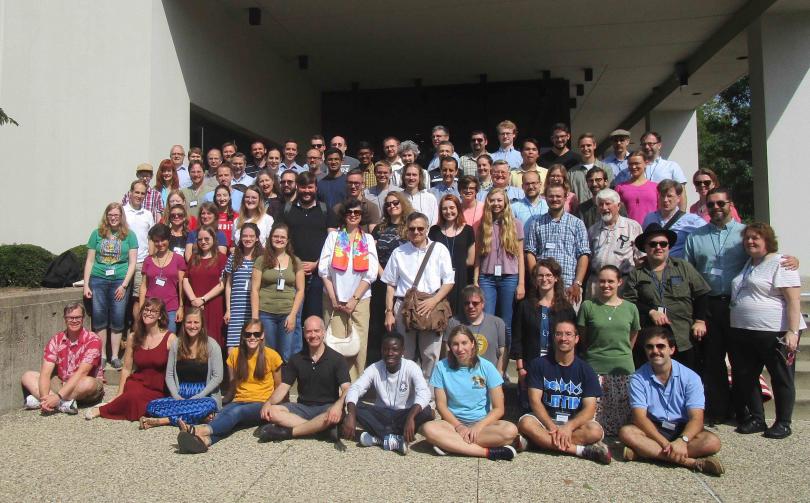By Richard LeComte

LEXINGTON, Ky. — Latin is a language as alive as alive can be — at the University of Kentucky’s College of Arts and Sciences.
UK students don’t just read Latin; they have seminars where they speak Latin to each other and write papers in Latin. And thus the language, key to Western civilization, lives on.
"We have a very unique program here,” said Milena Minkova, Ph.D., professor of classics in the Department of Modern and Classical Languages, Literatures and Cultures. “We don't just study Latin as normally taught in the curriculum. We study the whole Latin patrimony from antiquity until modern times in its continuity: these precious, precious treasures of works. And also, we do it in the target language, and we attract people from all over the world who come here to use this approach.”
The UK department provides an undergraduate degree track in classics, which includes Latin; it’s one of the 10 languages in which the faculty offers instruction. Also, UK offers a graduate certificate in the Institute for Latin Studies (Institutum Studiis Latinis Provehendis, if you will), which offers immersion both in written and spoken Latin – unusual for a language considered “dead.”
“Everything comes alive,” she said. “Latin is not being treated like a corpse to be dissected with dry grammatical rules. We engage in direct dialogue with the authors: people like Erasmus of Rotterdam, Thomas More and Isaac Newton, who have written in Latin over the centuries. We exchange with them thoughts and feelings, and we do it between ourselves in this language.”
Latin words and grammar have influenced English and the Romance languages for 2,000 years, and the Roman Catholic Church kept it alive in the Mass. Over time, Latin changed, as all languages do, the faculty members in Latin bring their knowledge of these changes to bear on how they and their students speak Latin.
"The medieval tradition which is based on the scriptures and the Church Fathers is the ancestor of the so-called Church Latin,” said Terence Tunberg, Ph.D., professor of classics and head of the institute. “Then in the Renaissance, the learned world still used Latin as the universal language. In the Renaissance, the idea was to turn back to the great authors of antiquity for the standards of morphology, construction, even metaphor. The Roman orator Cicero was one of their favorites.
“What happens is this new Latin is based on the classical authors, and they add new words for new things, like telescope, gunpowder or whatever and so the vocabulary changes. But the structure stays the same. In this way Latin becomes fixed and evolving at the same time. This is what's so amazing about it. And this is why it's such a useful scientific language because it's stable.”
Minkova said the spoken part of the program allows the use of several traditions of pronunciation, as differences exist between the Church Latin and the “new Latin” that started in the Renaissance.
“We accept both the ecclesiastical pronunciation and the so-called restored pronunciation,” Tunberg said. “The restored is basically an artificial construct, because over centuries Latin was pronounced in many different ways. But we obey the rules for where the accent goes, and we pronounce the syllables that are historically proven by our study of Latin poetry.”
The UK Latin website notes that a knowledge of Latin is useful in law, medicine and a host of other fields. But an enduring love of the language has fueled a post-World War II movement to revitalize Latin to promote cross-cultural understanding and world peace. UK’s program upholds that spirit through stressing using Latin as an oral communication tool.
"A Latin academy was founded in Italy, in which we both are actually members, and it holds a congress every four years,” Minkova said. “One of the first congresses was celebrated in Senegal. So it's not limited to Europe. Terence attended one of the seminars associated with it, and he decided to start a similar seminar in Lexington in 1996. Although there had been similar events in America connected closely to Catholic worship, Terence’s conventiculum was entirely secular and open to everybody. In the conventiculum’s first year only 11 people, I think, came. They spent one week together speaking and reading Latin and gradually this seminar grew up to 80 people per year from six continents.”
The graduate certificate program started in 2001 when Minkova arrived. Now the active Latin study draws about 15 to 20 graduate students. Latin remains a core building block in the history of Western humanities, and beyond, and its study offers entry to a wide world of knowledge.
“There is a real Renaissance of Latin on the high school level in the United States, and many people have been asking us to offer these classes online because they could not leave their jobs or their families and move to Kentucky,” Minkova said. “Many teachers from every corner of the United States want to participate. They want this training, and Latin is booming.”
